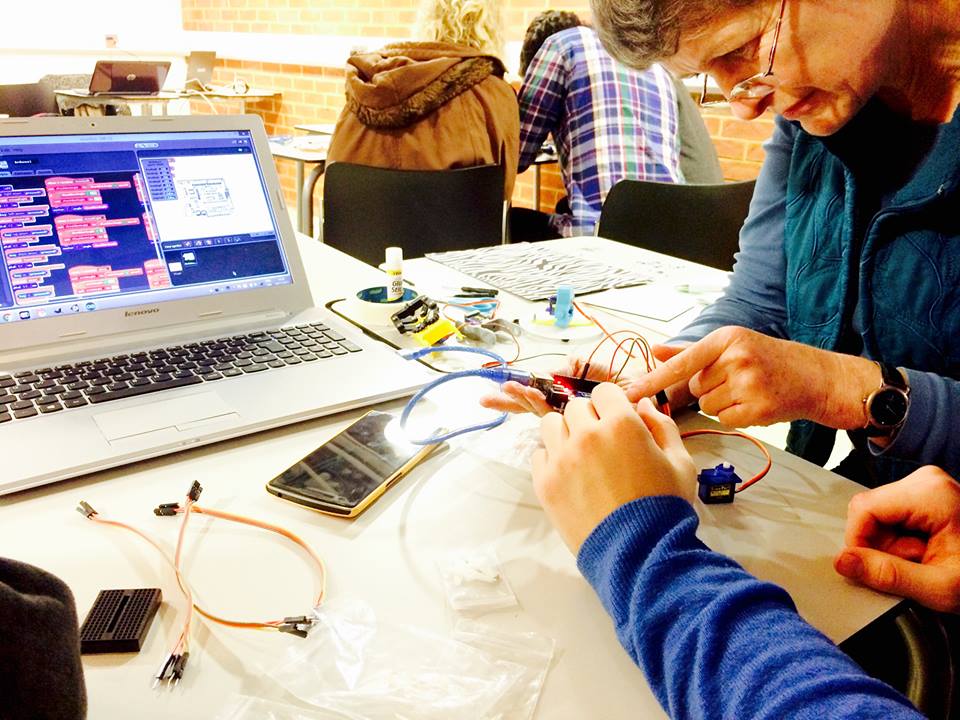Mobile technologies take up a large part of most people’s lives. But in an age of information overload, young people tend to use mobile technologies a lot more for social networking and entertainment rather than academic research.
The annual Mobile Technologies Week at the University of Sussex took place on 23rd – 27th November 2015. The Library and Technology Enhanced Learning have come together to provide staff and students at the University of Sussex with a great programme of events around the use of mobile devices and technologies to support teaching, learning and research. This year’s expanded programme included examples of innovative use of technologies at Sussex, with input from our students and academics.
The week featured a number of exciting events, including an insightful workshop on using e-books, an illuminating session on augmented reality and magic books, an interesting session on researcher identifiers to boost productivity and ensure that they are credited for their work.
The highlight of the week was Tuesday’s ‘Pop-up Makerspace’, a fascinating hands-on introduction to constructing, coding and controlling a robot. The workshop attracted participants from diverse academic backgrounds, including students majoring in Law, Psychology, Media and Communications, and more. Led by the Brighton-based MakerClub, this workshop gave an introduction to robotics, coding, 3D printing and the opportunity to explore these emerging technologies. Participants were given professional kit and craft to build their own robot and learnt to use a simple program to write a piece of code and bring it to life.
Participants were first introduced to the concept of an Arduino, a mini computer which can be plugged into a laptop. This microcontroller has no operating system but only runs the codes, instead of programmes, which are pushed into it. Such concept can be applied in the construction of a car, for example, which uses around 40 of them. It is much cheaper to build microcontrollers and sell to many different companies than a specialized circuit. The adaptability is what makes microcontroller so ubiquitous now, as it can be adopted almost everywhere, from lightbulbs to cars.
“Without any prior experience and knowledge in robotics, I didn’t know how far my interest in robots could take me. I’m glad the computer programme has a user-friendly interface” , a psychology student said.
The MakerClub, founded in 2014, hopes to engage the general public with a new concept of technology through a browser-based learning platform. Despite that the company only has four full-time staff at the moment, they are grateful to be supported by big companies including KickStarter, and determined to make their business flourish. Users can get the components, print the kits and code the project by themselves at home.
“People who consumed content in the past now become content creators, resulting in a huge sharing platform where users can gain cross-curricular knowledge in fields like 3D printing, design and engineering”, the workshop leader explained. The age of ‘prosumption’ – where the lines between production and consumption becomes blurred – has given rise to more user-generated content.
Through the creation of Web 2.0 and digital convergence, making full use of technology can give rise to many business opportunities. For example, Internet users rise to fame through Youtube, making their prosumption behaviours their profession and source of income.
The 2-hour workshop covered the basic building blocks of robotics and taught participants to make their mini robots move. The quick learners were then put into groups and took part in a design challenge where they had to construct a moving robot within 15 minutes. In the end, they were also given the opportunity to sneak preview ‘The Grabber Arm’, which will be officially released in March 2016.
In an era where non-medical-related technology seems to be overlooked and underrated, human beings take many things for granted. For example, we are used to utilizing free cloud-computing services for storing data online without paying attention to the complexity of a Wifi router which communicates with the internet.
The workshop demonstrated how to embed the physical in the digital, emphasizing how powerful microcontrollers are, as they are devices which have almost no button, no human interface, but could send and obtain grab data from internet to carry out actions. They can be operated remotely via internet – a common gateway for communication. Employing existing technologies to a greater scale is what companies should be thinking about, when expanding their businesses.
When asked about 3D printing, it was explained that this technology is not limited to printers, but includes lamination, melting electron beams, selective laser melting, electronic beam melting, and more. Future technological inventions would imply the creation for automotive, aerospace, military, medical purposes.
Maker Club is leading a campaign to get the printers in every school in the country and want Brighton and Hove to lead the way. Hopefully, in the near future, every school in Brighton and Hove will have its own 3D printer, if campaigners get their way.
For more information about the week, please check out the #sussexmtw hashtag on Twitter.
Dorothy Yim, Science Editor

